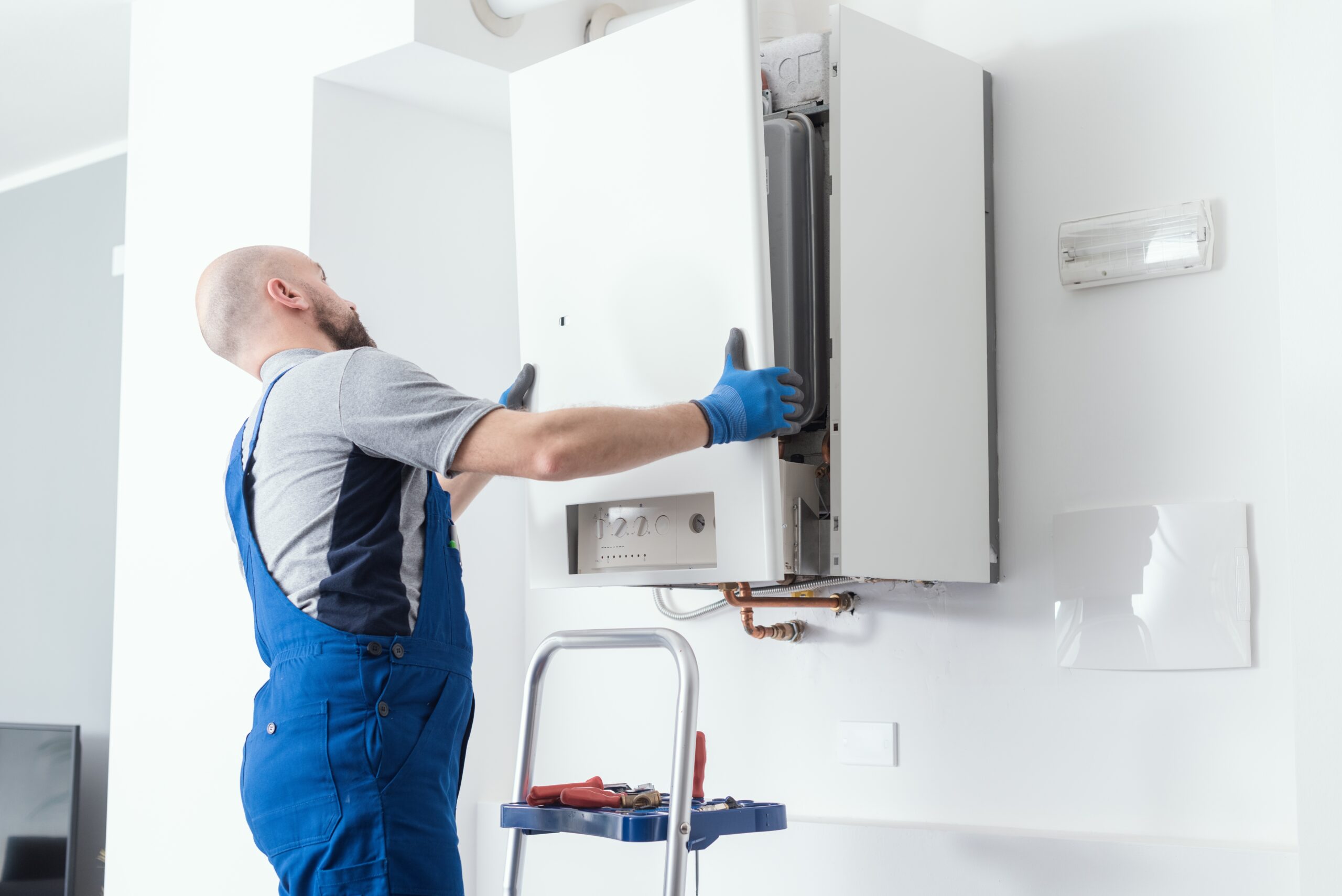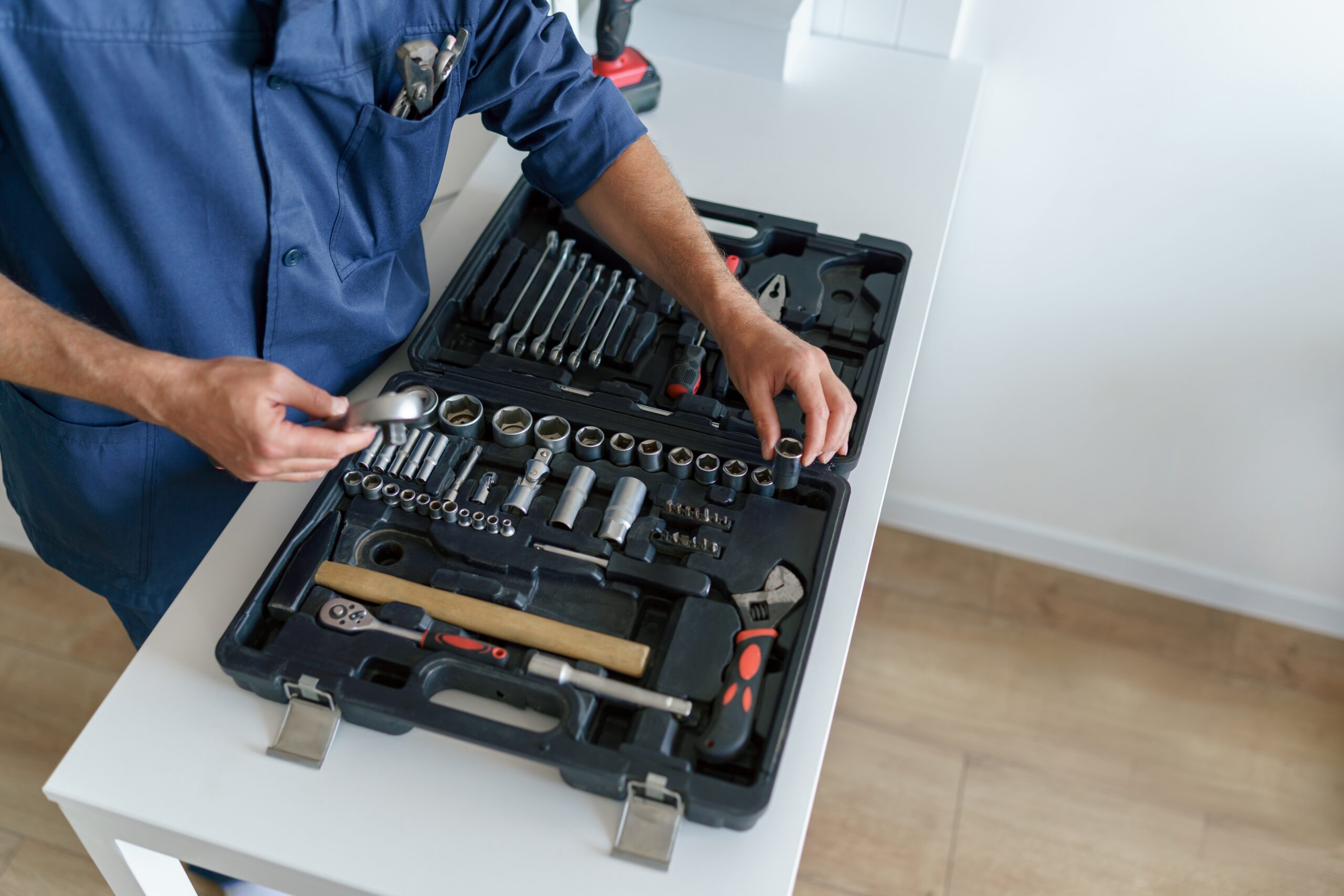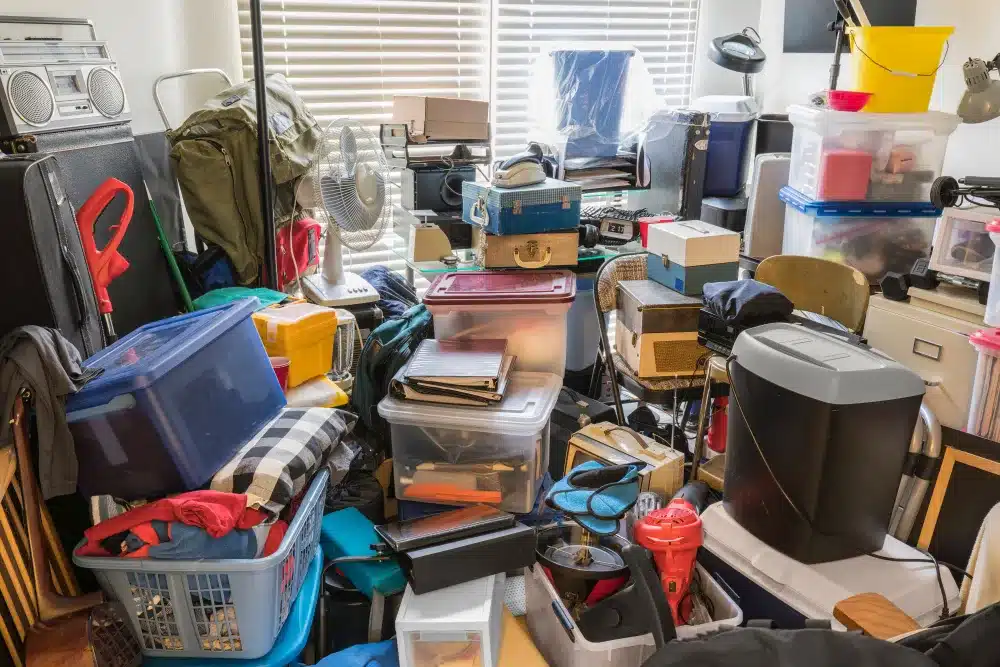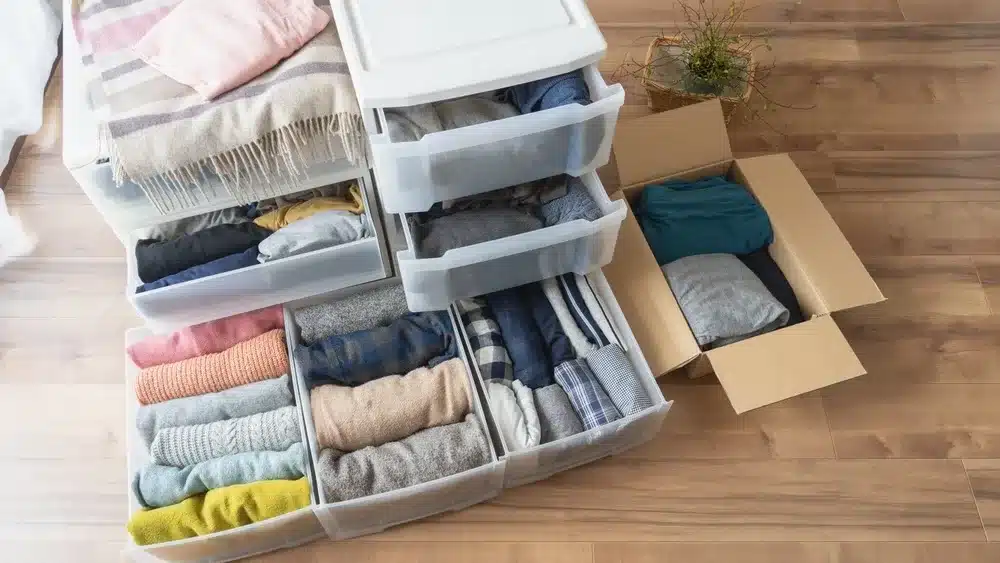With more and more office jobs transitioning to freelance, fully remote, or hybrid work arrangements, there’s an increased need for personal, independent office space.
But at the same time, economic factors are encouraging some of us to downsize our living space. In contrast, others share a living space with roommates or family members – including children – who aren’t able to give us the privacy we need to take calls or focus on our tasks.
That’s where an external private office space can really help us out. Traditional office space rentals are more expensive than ever, leading many of us to seek out less costly options. But where do you find an affordable office space that doesn’t require us to sign a commercial lease or work shoulder to shoulder with coworkers?
That’s where self-storage units come in.
Storage units are the new frontier for small businesses in more than one way. They can serve as a storage space to free up that spare bedroom at home, for example. Or they can serve as a backstock storage and fulfillment center for small businesses.
But if you find the right storage unit, secure what you need for an essential office setup, and navigate the legal considerations, you can set up an office in a storage unit. This guide explains how to make an office in a storage unit and save big. We’ll also explain how Storage.com can help you find the ideal storage facility for converting a storage unit into an office space. But before we get into the logistics and financial details, let’s take a quick look at why storage units make great office spaces.
Can You Have an Office in a Storage Unit? The Benefits of a Storage Unit Office Space
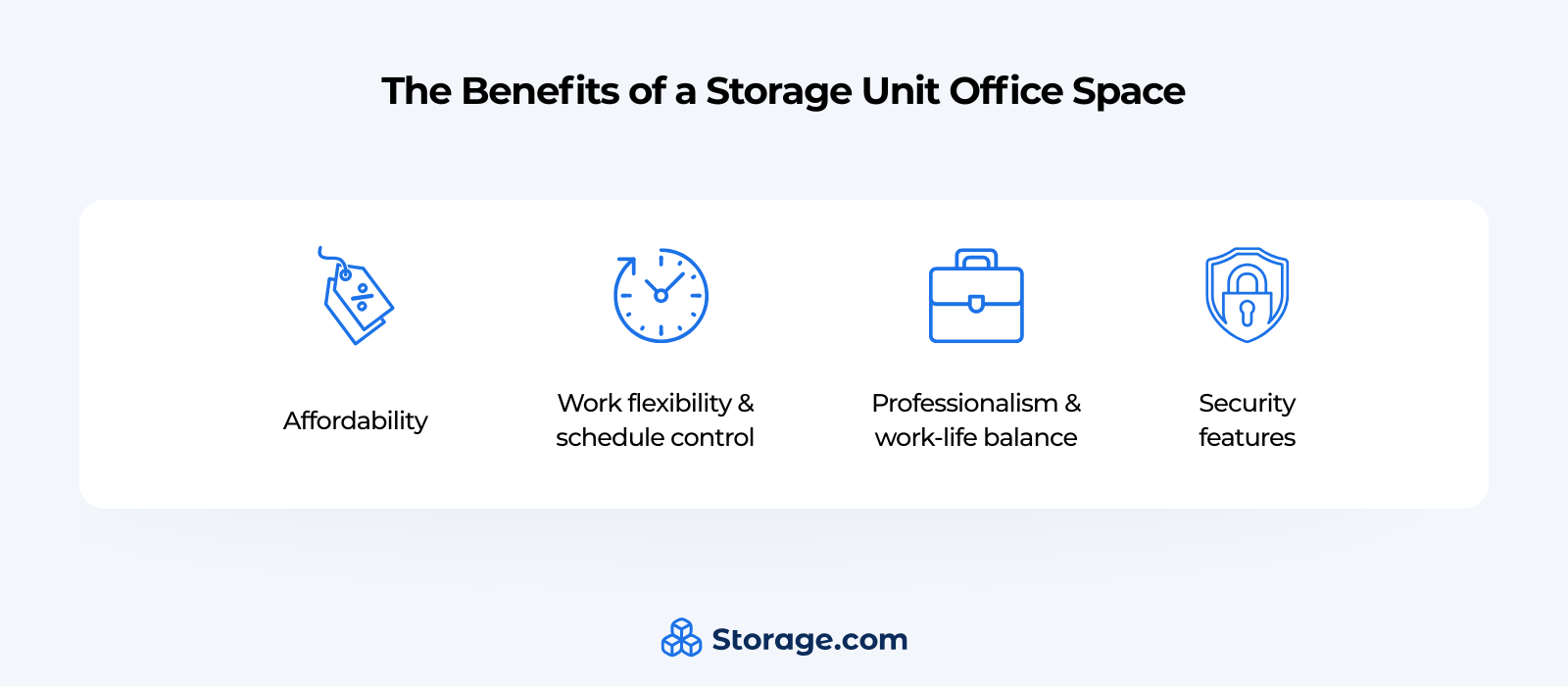
You can have an office in a storage unit as long as the facility allows you to work on-site. Beyond just the cost advantages, the benefits of a storage unit office space include physical and psychological flexibility, customizable layout, and work/home boundaries.
An Office in a Storage Unit Is Highly Affordable
The average monthly cost of an office space rental is between $20 and $50 per square foot. Your typical storage unit, on the other hand, averages between $1-$3 per square foot each month. In addition to the clearly lower cost in rent, a storage unit doesn’t require expensive deposits or long-term commitments.
Many storage unit leases are month-to-month, with some facilities even offering 7-day contract periods. And the facilities that require renters to sign longer contracts often only ask for a 3-6 month lease with a minimum deposit, if any.
Your monthly storage unit rent also includes your utility bills and security fees. Conversely, many office space rentals require tenants to be responsible for those costs on their own, independent from what’s included in the monthly rent.
A Private Office in a Storage Unit Gives You Work Flexibility and Schedule Control
Using a storage unit for a small business office also allows a lot of flexibility and schedule control. For starters, a storage unit office gives you your own private and quiet environment to focus on.
The flexibility that stems from building your office in a storage unit also includes the hours you can work.
Lots of storage facilities offer tenants 24-hour access to their unit, 7 days a week. These facilities are protected by an electronic gate.
- 24-hour storage facilities provide renters with a unique code. Coded gate entry ensures only tenants are able to enter after business hours.
- Security cameras, motion sensors, and alarms keep you safe while you plug away at office work late at night.
A storage unit office also makes it easy to scale up or down based on your business needs. At the end of your short contract, you can request a larger or smaller unit size based on your business needs.
- Maybe your inventory is growing fast, or maybe you feel you’re renting more office space than you need.
- With office rentals, you have to wait until your contract is up and then move across town.
- Upsizing or downsizing your storage unit office is as simple as dolling your office gear from one unit to another without having to leave the facility.
An Offsite Storage Unit Office Provides Professionalism and Work-Life Balance
Working from home has its perks, but it also comes with challenges. Your books, TV, video games, back yard, and family members are all tempting you to take a quick break that may end up lasting two hours.
And conversely, when you’re off work, enjoying a movie with your partner, and get an email notification, your home office is there tempting you to log in and knock out a quick task that takes you away from your downtime.
Setting up an off-site office in a storage unit helps you separate work from home distractions and your personal life from work distractions.
While not all storage facilities allow visitors, many do. You can set up a meeting space in half of your storage unit, with some chairs and a small table. Or if you take most of your meetings virtually, like many of us do these days, set up a professional-looking backdrop for video calls on one of the walls of your self-storage unit office space.
A storage unit office gives you room to store office supplies, tools, business documents, and records on shelving units or in filing cabinets. Some storage facilities even allow tenants to receive mail and packages in the front office.
Onsite Security Features
In an office space rental, you’re not only responsible for utility expenses, but also for installing and paying for security measures like camera and alarm systems. And if you want professional security personnel guarding your office, you’ll have to pay them a pretty high hourly rate.
On the other hand, more than a few self-storage facilities make enhanced security system features a priority.
- Motion sensors and 24-hour cameras help monitor activity at all hours.
- Security alarms keep questionable people from accessing storage units they don’t have a keycard or code for.
- Personalized coded gate entry and door codes track entry and exit times, allowing the facility managers to know which tenants are coming and going from the facility and how long they were there.
- Security-focused storage facilities often employ on-site security when the office is closed, and may even have a manager who lives on-site.
Another perk of using a storage unit for your office space is backup generators. Storage facilities with electricity often provide backup power generators in case the power goes out inside your unit, and to help renters navigate the halls and parking lot at night by keeping the lighting on.
Of course, you can’t just set up an office in any old storage facility. You’ll need to find a facility that has the amenities you need for an office space. But before we get into that, let’s take a look at the legal considerations.
Legal Considerations and Facility Requirements When Using Self Storage for Business
Before you create an office in a storage unit, you’ll need to check the storage facility rules to see if it’s allowed. There are also the local council and city regulations to consider.
Understanding Storage Unit Lease Restrictions
Your first consideration is the storage facility itself. Different facilities have different contracts and lease restrictions dictating how the units can be used, whether you can have visitors and receive mail, and if you can work on-site.
Check the website for the specific storage facility you’re considering, as they often list their specific rules online.
- Some self-storage units are explicitly intended for personal storage only, while others allow business inventory storage, but don’t let you work in the unit.
- Other facilities not only allow you to use a storage unit as a workspace, but encourage it.
- We suggest contacting management directly and letting them know that you’re looking for an office space where you can actively work before signing the lease.
- If they agree, we recommend requesting written permission from the manager in case an employee or tenant raises concerns.
Zoning and Business License Requirements for a Storage Unit Office Space
It’s easy to assume that since a storage facility is a business, it’s automatically zoned for business or commercial use. While this is true in many cases, it’s also not uncommon for storage facilities to be located in residential zones.
Again, we suggest cleaning this matter up with facility management before you commit to a lease. And suppose they are zoned for commercial use and the facility encourages you to set up your office in a storage unit on their premises. In that case, that doesn’t mean you can use the facility address as your business address, even if the facility allows you to receive mail and packages.
The typical way to work around this is to use your home address as your business address for all tax and clerical purposes. You can still claim your storage unit as a business expense, whether you’re an online seller using it for business inventory storage or a full-time professional in need of an off-site office space.
Business Insurance and Liability for an Office in a Storage Unit
Most storage units include insurance coverage in their monthly rent, which covers the contents of your storage unit against theft, vandalism, or accidents up to a certain amount. Many facilities offer insurance package upgrades, which increase your monthly rent price but also offer a significantly higher coverage amount.
That said, these storage insurance packages cover the belongings inside the storage unit, not your business assets.
So while your office equipment and business inventory may be covered up to a certain amount by storage insurance, you may still consider a business insurance policy to protect your business against financial risks and losses caused by things like lawsuits and employee injuries.
Essential Setup Requirements and Storage Unit Features for a Self Storage Business Office
Now that we understand the legal and lease restrictions you’ll have to navigate, let’s take a look at the essential storage unit features you’ll need in order to convert a storage unit into an office.
Storage Unit Features
We already discussed the need for security measures like cameras, coded gate entry, and onsite security personnel, but there are some storage unit features even more fundamental than that.
For starters, you need a storage unit with electrical outlets. The newer the storage facility, the more likely it is to have units with electricity. Some units will even host multiple outlets with power strips.
Another pro tip is finding a storage facility advertising business storage solutions, as they often assume business owners need electricity, even if they’re just using the unit to store merchandise and fulfill orders.
A storage unit with electricity is an obvious must for an office space, since you need power for your computer, printer, and to keep your phone charged. But it also gives you a wider range of professional lighting options, including backlighting for calls. That way, you’re not relying on the fluorescent lighting hanging above your unit.
Another must-have is climate control. Climate-controlled storage units do more than just hold a comfortable room temperature that doesn’t get cooler than 60 or hotter than 80 degrees. They also use humidity monitoring and control systems to hold humidity levels between 30% and 60%.
Climate control keeps your office and electronic equipment safe year-round, and keeps you comfortable while you’re working in the harsher cold or hot months.
For business operations to run like normal, you’ll obviously need a strong internet connection.
- Until recently, WIFI in storage units was uncommon.
- That said, newer storage facilities, especially in urban areas, have been offering WIFI as an added perk.
- It hasn’t caught on to the point of being a widespread feature, however, so you may have to settle for a mobile hot spot or satellite internet connection.
Storage Unit Size Guide
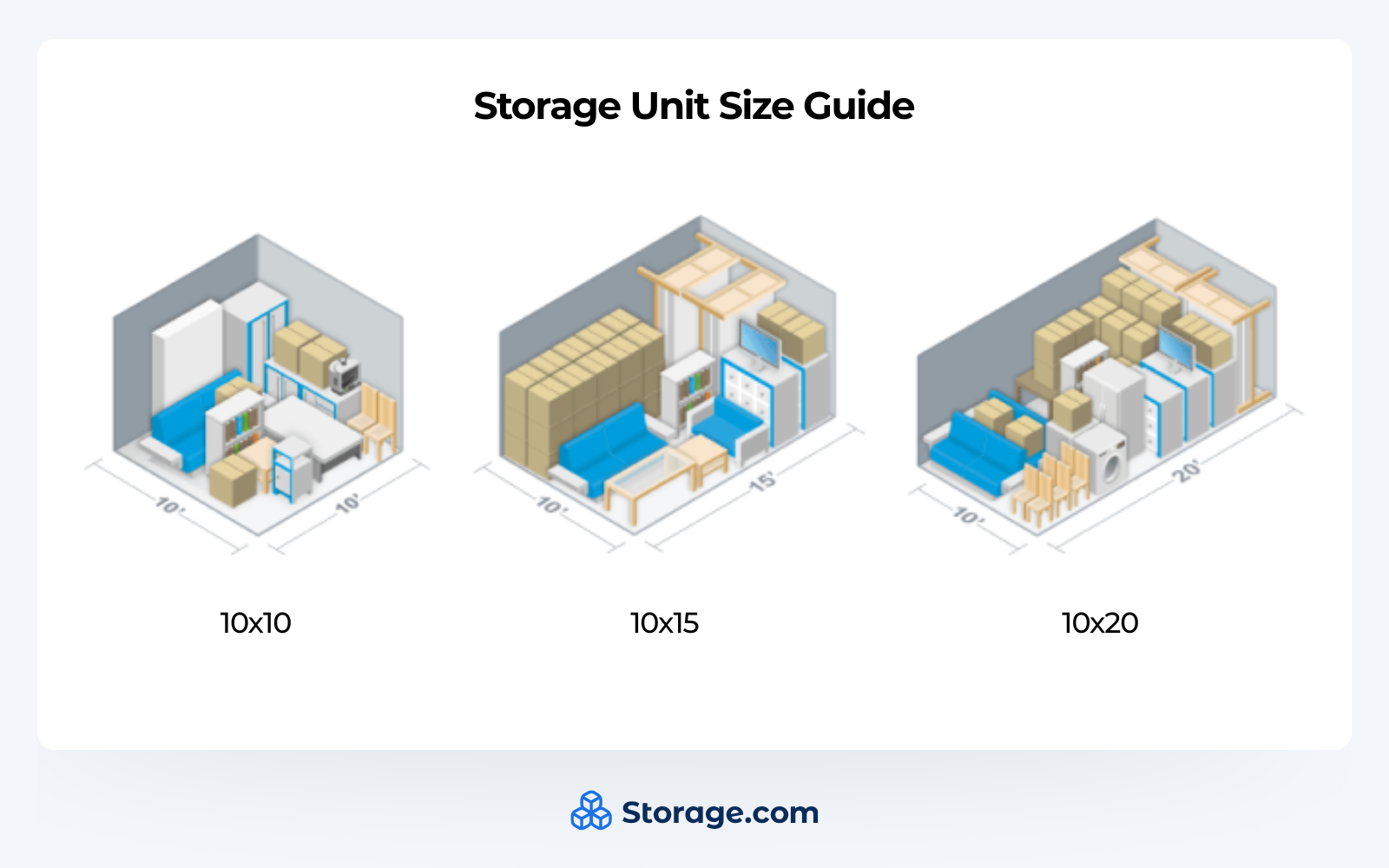
Storage units come in a variety of sizes. At the bare minimum, you’ll need space for a desk and office chair, a filing cabinet or shelving unit, and a small office supply storage system.
In addition to ensuring you have enough space, consider the shape of the unit you want for your ideal office setup. For example, some units are square-shaped (10×10 storage units) and others are shotgun-style rectangles (5×10 storage units, or 5×15 storage units). At the bare minimum, different shapes and sizes give you maximum customization over your office setup.
| Storage Unit Size | Ideal Scenario For Office Storage Unit Size |
|---|---|
| 10×10 Self Storage Unit | 10×10 units are the size we recommend for a single-person office setup, especially if you only talk with clients and team members on virtual video calls, and don’t need to take meetings in person. |
| 10×15 Self Storage Unit | 10×15 is the unit size you want if you need to meet with occasional clients, have a small team working alongside you once in a while, or need an expanded workspace for online seller business inventory or an order fulfillment station. |
| 10×20+ Self Storage Unit | 10×20 and larger will give you enough room for multiple permanent workstations and a meeting room, making this XL maxi storage unit your best bet for sharing your storage unit office space with associates on a regular basis. |
Once you’ve chosen a storage unit size for your office space, it’s time to start mapping out your storage unit office layout and design. Consider the sizes of your office furniture, including shelves for office supplies or filing cabinets for documents, periodicals, or newspaper storage.
You’ll want to make sure the total square footage of your storage unit is more than the total square footage of your furniture, with plenty of room for you to move around.
Self Storage Office Space Setup and Design Ideas
With your office equipment dimensions measurements on hand, you can start planning out your storage unit office setup. This includes your workspace design and equipment setup. Consider how professional an appearance you’ll need to maintain, especially if you’re holding meetings virtually or in person.
Storage Unit Office Workspace Arrangement
Your workspace setup starts with a desk and seating arrangements. You’ll need to decide on supply storage and document filing solutions, and then map out your equipment placement. We suggest implementing modular, sectional, or multi-purpose office furniture and equipment that you can cross-utilize in order to save space.
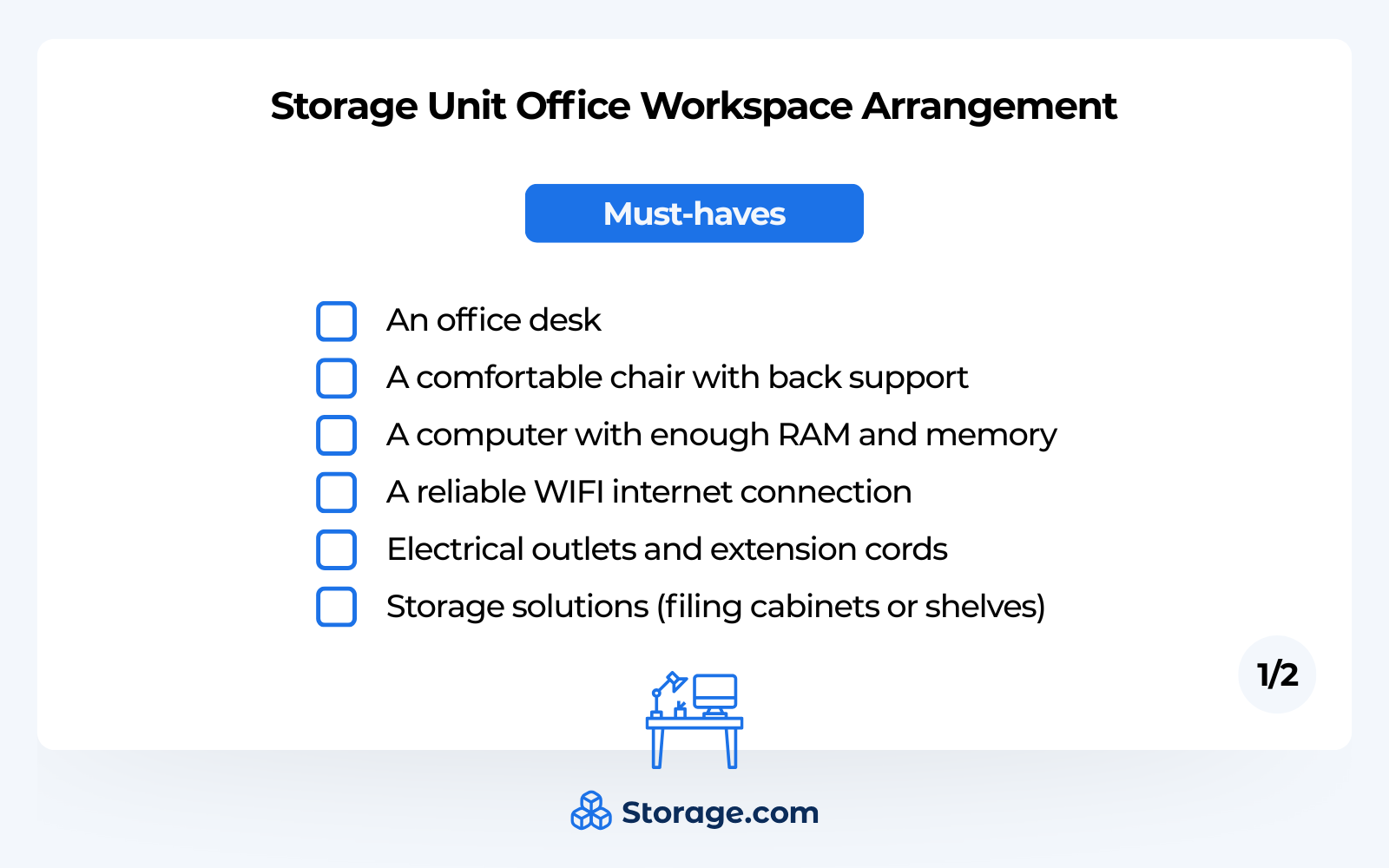
Here’s a quick list of some items every office in a storage unit should have:
- An actual, solid, office desk that doesn’t shake while you work.
- A comfortable chair that supports your back.
- A computer with enough RAM and memory to run your business smoothly.
- A reliable WIFI internet connection that can handle video calls.
- Electrical outlets and extension cords.
- Storage solutions like filing cabinets or shelves, business documents, reference books, and office supplies.
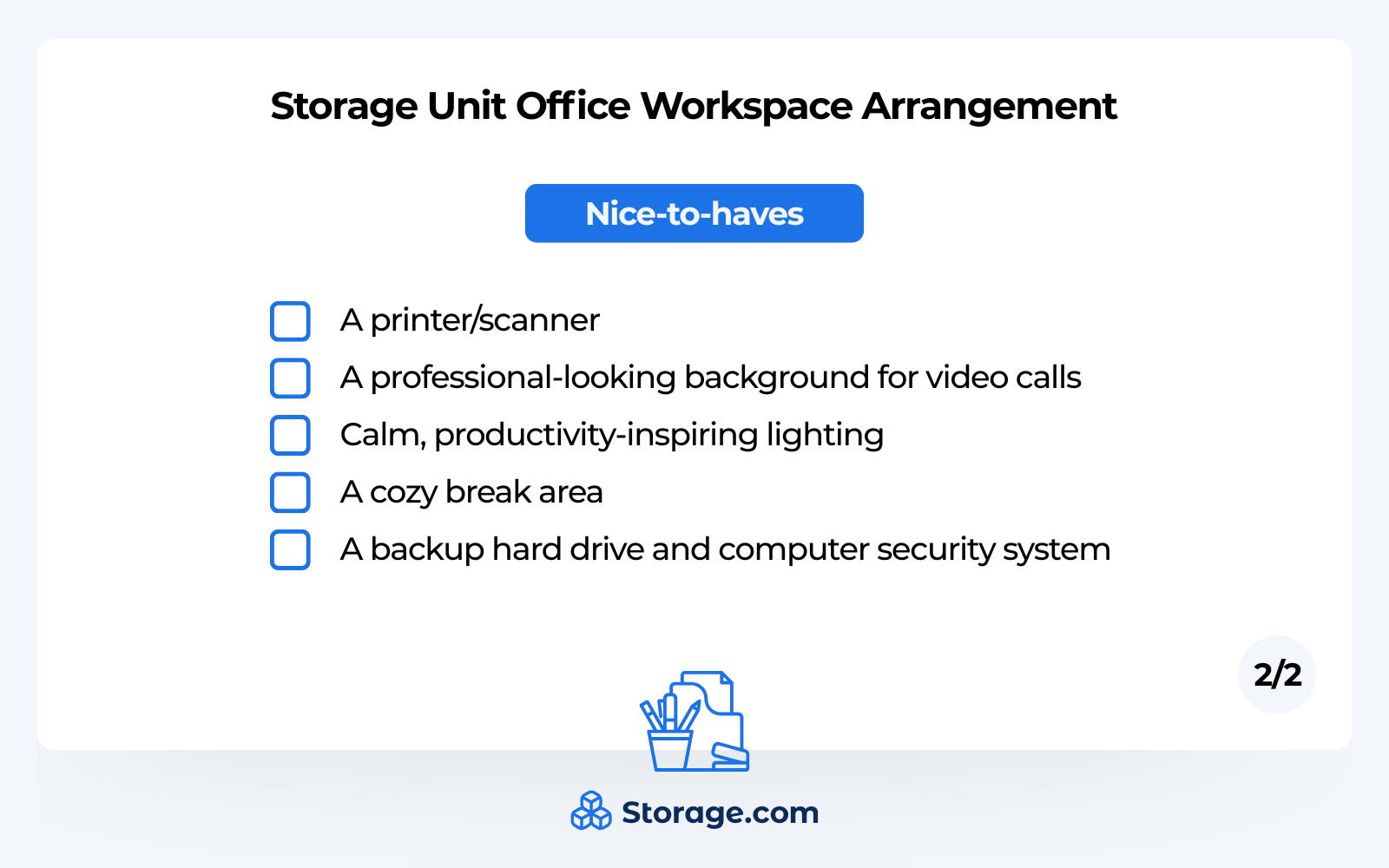
And here are some storage unit office workspace nice-to-haves:
- A printer/scanner, in case you need physical paper copies.
- A professional-looking background for video calls.
- Calm, productivity-inspiring lighting.
- A cozy, chill corner where you can take a break.
- A backup hard drive and computer security system.
You can also combine these elements to save space. For example, you can wrap your bookshelf in string lights to save some space.
Make Your Office in a Storage Unit Feel Professional
You might think of a storage unit as a drab garage-style space that won’t give off the same professional tones as renting a cubicle in a shared office space would.
On the contrary, it’s an empty space ready to be customized with your own personal touch. A storage unit office space can feel more than just professional, but comfortable.
- We already mentioned how a climate-controlled storage unit office space maintains consistent temperatures and humidity levels year-round.
- We also mentioned relaxing mood lighting to help you focus.
- You can add to both these comfort features by hooking up some space heaters, fans, and a professional back-light setup for video calls.
Another benefit of building an office in a storage unit over renting a shared office space is the privacy. You can enhance your privacy and assist your focus level by installing noise-reducing sound-dampening panels on the walls.
Then, you can hang tapestries on the walls and enhance your business image by lacing them with your personalized branding. Add some rubber gym tiles as flooring, not just to make the vibe cozy, but to make your feet and back more comfortable during long days at the office.
Now that we’ve reviewed some of the general storage unit office space design ideas, let’s take a look at a few industry-specific storage unit office arrangements.
Self Storage Office Space Industry-Specific Setups and Benefits
Some of the most popular fields from which professionals can benefit from an office in a storage unit include marketing and consulting services, creative businesses, and online e-commerce entrepreneurs.
| Industry or Field | Industry Specific Setups and Benefits |
|---|---|
| Consulting Services and Marketing Professionals | A storage unit office space provides consultants and professionals working in all aspects of marketing with a private place to meet, both virtually and in person. The customizable nature of a storage unit allows a variety of options for client meeting zones. And if you took our advice and booked a unit at a facility with enhanced security systems, security cameras, electronic locks, and security personnel to protect any sensitive or confidential documents. |
| Professional Creatives and Artists | Artists and graphic designers can use a storage unit workspace as a design studio, with space for a craft station and art/art supply storage. And photographers will find ample space for a photography studio, photo storage, and an editing suite. Writers have space for their desk set up and bookshelves full of books for inspirational research. |
| E-commerce and Online Businesses | Self-storage unit offices provide flexible e-commerce storage solutions that allow businesses to scale operations as they grow. They provide space for inventory management systems and e-commerce fulfillment centers, with space for packaging stations and shipping supplies. |
Financial Benefits of Making an Office in a Storage Unit Compared to a Home Office or Renting a Commercial Office Space
Now, let’s take a look at how a storage unit office space can help you save money and how much you’ll need to earn to break even.
First, we’ll look at the setup cost breakdown of any office. Then we’ll consider how much it costs to rent an office for a small business, set up a home office, or rent a storage unit office space. Finally, we’ll look at how much you’ll need to break even in both scenarios.
Office Space Setup Costs
The initial costs of setting up an office space are the same regardless of whether you’re setting it up at home, in a storage unit, or renting an industrial office space. You may already have a lot of the things on this list. If so, adjust these numbers accordingly for a more accurate cost.
| Office Requirements | What It Includes | How Much Does It Cost |
|---|---|---|
| Furniture | A basic office desk with enough space to work and stay organized. An ergonomic office chair you can work in for a full workday without getting uncomfortable and losing focus. | $500-$2,000 |
| Lighting | Backlighting for video calls and calm, focus-oriented task lighting for your workspace. | $50-$500 |
| Technology and Equipment | Computers, monitors, printers, mouse and mouse pad, Bluetooth speakers, headsets or earbuds for video calls. | $500-$5,000 |
Monthly Costs of Renting a Commercial Office Space for a Small Business
A commercial office space costs between $20-$50 per square foot, depending on location, luxury, and whether the space is already furnished. That means you’re paying between $5,000 and $12,000 a month for a 250 square foot office space. In some cases, these numbers include maintenance and repair costs.
A warehouse rental is typically cheaper than an office space rental, but still more expensive than the cost of a storage unit.
Unlike a storage facility rental, the tenant of an office or warehouse rental is typically responsible for utility costs such as electricity, water, climate control, and heating. In a shared office space scenario where you’re renting a segment in an entire floor full of office spaces, utility costs may be shared by all the tenants of that floor. If you’re renting your own space and converting it into an office, you can expect to pay for installation and connection costs as well.
While the building may have its own security alarm systems, you’ll likely have to pay for cameras and any security personnel. Tenants are typically required to find and pay for their own parking, which may or may not include security supervision of their vehicle.
Scaling up your office size typically requires finding a new office space rental in a different building, which means signing a new lease, paying the costs, and going through the process of moving your office contents from one place to another.
The Cost of Setting up an Office Space at Home
If you decide to convert a spare room of your home into an office space, you’ll need to scale up your internet bandwidth so it can handle the daily grind.
You’re obviously responsible for the cost of all your utilities, which will increase if you’re working from home 40 hours a week. You’re also responsible for the costs of any security systems you decide to install to protect your valuable office equipment.
If you don’t have a spare room at home, or if you need to scale up your office size to accommodate your growing business, you’ll have to build one out; you’re looking at a huge initial cost. We nabbed the following home office addition cost chart from Builds and Buys to help you decide if your return on investment for building a home office space is worth it.
| Component | Cost Range | % of Budget | Details |
|---|---|---|---|
| Foundation & Structure | $4,000 – $10,000 | 20-25% | Foundation or floor reinforcement |
| Framing & Exterior | $4,000 – $8,000 | 15-20% | Walls, roof tie-in, siding |
| Windows & Doors | $2,500 – $6,000 | 10-15% | Natural light is crucial for productivity |
| Electrical & Data | $3,000 – $6,000 | 15-20% | 20+ outlets, ethernet, dedicated circuits |
| HVAC Extension | $2,000 – $5,000 | 8-12% | Separate zone recommended |
| Insulation & Soundproofing | $1,500 – $4,000 | 5-10% | Essential for video calls |
| Interior Finishing | $4,000 – $10,000 | 15-25% | Drywall, paint, flooring, trim |
| Built-in Storage | $2,000 – $8,000 | 8-15% | Shelving, cabinets, desk systems |
Monthly Costs of Renting a Storage Unit Office Space
The average monthly cost of a long-term storage unit rental is $1-$3 a month per square foot. Depending on the amenities. So, for a 250 square foot storage unit (a 10×25), you’re looking at between $250 and $750, depending on where you’re located and the features your unit offers.
Below are the costs per size for a basic storage unit. Keep in mind that climate control and security amenities may increase these numbers by 10%-20%.
| Size | Size Comparison | Average Cost |
|---|---|---|
| 5×10 | Large walk-in closet | $75/month |
| 10×10 / 10×15 | Bedroom | $150/month |
| 10×20 / 10×30 | Garage | $300/month |
You’ll still have to pay for your own WIFI with a storage unit office space, but your electricity and climate control utilities, and security systems usage costs are included in your monthly rent. Storage units often employ backup power supplies in case of an outage, and there are no installation or connection fees since the unit is already hooked up.
Your monthly storage unit rent also covers maintenance and groundskeeping, which is handled by the facility staff. And your unit comes with a guaranteed parking space.
Storage units often come with insurance that covers a certain amount of damage to the contents. But depending on how much you invested in your furniture and equipment, you may want to pay a little extra for an add-on that covers the full value of your computer, desk, lighting, etc.
Keep in mind that storage insurance covers your property, and not business damages like employee injuries or lawsuits.
Scaling up your storage unit size is as simple as switching to a larger unit in the same facility and using the dollies and handcarts to move your equipment from one unit to another. For a more detailed analysis of the initial and monthly costs of an office in a storage unit and what you’ll need in order to secure a unit, check out our guide on what to expect when renting a storage unit.
How Storage.com Can Help You Get Started with an Office in a Storage Unit
Now that you have all the facts, you can decide which office space options are right for you. If you do choose to take the storage unit route, the first step is researching business-friendly storage facilities in your area that encourage you to work in your unit.
You’ll want to come up with a realistic setup timeline that doesn’t require you to miss out on too much work. Since there are no connections or installations required in a storage unit, it’s as simple as choosing a weekend, renting a moving truck, and buying and lugging all your office equipment into the unit and setting it up to your liking.
Some storage units even allow you to receive packages. If that’s the case, we suggest cutting down your move-in costs by having everything delivered to the front desk of the facility and using the free dollies and hand carts to wheel it over to your unit.
We covered all the essential office equipment and nice-to-haves above. We suggest making an office furniture and equipment checklist and doing all your shopping at once. Once you’re set up, you’ve got a personal storage unit office space you can refine as your business grows.
In addition to a facility that encourages business operations, we also suggest amenities like climate control and enhanced security features, as we mentioned above.
But not all storage facilities offer all these amenities. How do you find a storage unit that allows business and has everything you need to convert it into a comfortable and functional office space?
Lucky for you, Storage.com is here to help.
Storage.com lets you browse and compare self-storage units using amenity filters that isolate the storage facilities in your area with all the ideal storage features your storage unit office needs.
Just punch your zip code into our signature Storage.com search tool, and you’ll see what we mean.
We’ll filter through the thousands of local storage facilities for you, making it easy to find the storage unit that best fits your online business’s needs.
Whether you’re looking for a storage unit with climate control, electricity, alarms, 24-hour access, drive-up access, or security cameras, Storage.com makes the process quick and painless. All you have to do is choose a storage unit and your move-in date, and we’ll take care of the rest. And if you have any questions about commercial or business storage that this guide didn’t answer, feel free to ask. Our storage representatives are just a phone call away!


